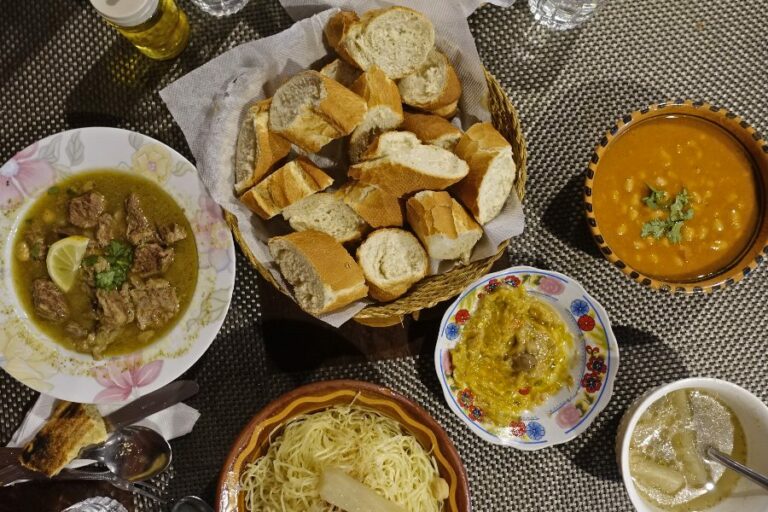Introduction: What is Algerian cuisine?
Algerian cuisine is a blend of diverse cultures and influences, reflecting the country’s history and geography. It is a fusion of Berber, Arab, Andalusian, Ottoman, and French cuisine, resulting in a unique and flavorful cuisine. Algerian dishes are characterized by the use of spices, herbs, grains, and vegetables, along with meat and dairy products.
Algerian cuisine is known for its diversity, with each region having its own distinctive cuisine. The coastal areas are known for their seafood dishes, while the inland regions are known for their hearty stews and meat dishes. Algerian cuisine has gained popularity in recent years, with many Algerian restaurants opening up in different parts of the world.
The influence of geography on Algerian cuisine
The geography of Algeria has had a significant influence on its cuisine. The country’s location on the Mediterranean coast has made seafood a popular ingredient in coastal areas, while the hot and dry climate of the Sahara has resulted in the use of grains and vegetables in inland regions. The Atlas Mountains, which run through the country, have also played a role in shaping Algerian cuisine.
The mountains provide a source of fresh water and fertile soil, making it possible to grow a variety of fruits and vegetables. Berber tribes, who have lived in the Atlas Mountains for centuries, have also had a significant impact on Algerian cuisine. Many of the traditional dishes, such as couscous and tagine, have their roots in Berber cuisine.
The role of spices and herbs in Algerian cuisine
Spices and herbs are an essential part of Algerian cuisine, adding flavor and depth to dishes. Common spices used in Algerian cuisine include cumin, coriander, paprika, turmeric, and saffron. Herbs such as parsley, cilantro, and mint are also widely used.
Algerian cuisine is known for its use of spice blends, such as ras el hanout and baharat, which are used to flavor meat, fish, and vegetables. Harissa, a spicy paste made from chili peppers and spices, is also a staple in Algerian cuisine and is often served with bread.
The importance of grains in Algerian cuisine
Grains are a staple in Algerian cuisine, with couscous being the most popular. Couscous is made from semolina, a type of wheat, and is often served with vegetables and meat. Other grains used in Algerian cuisine include bulgur, rice, and barley.
Bread is also an important part of Algerian cuisine, with many different types of bread available. Khobz, a type of round bread, is the most common and is often served with olive oil and harissa.
Meat and dairy: key ingredients in Algerian dishes
Meat is a key ingredient in Algerian cuisine, with lamb, beef, and chicken being the most popular. Meat is often cooked in stews, such as tagine, which is a slow-cooked dish made with meat, vegetables, and spices.
Dairy products, such as yogurt and cheese, are also widely used in Algerian cuisine. Raïb, a type of yogurt, is often served with couscous, while feta cheese is used in salads and other dishes.
Vegetables in Algerian cuisine: diverse and flavorful
Vegetables are an essential part of Algerian cuisine, with a wide variety of vegetables used in dishes. Tomatoes, peppers, onions, and eggplants are commonly used, along with leafy greens such as spinach and kale.
Vegetables are often cooked in stews or served as a side dish. Zaalouk, a dish made with eggplants and tomatoes, is a popular side dish in Algeria and is often served with bread.
Algerian cuisine and seafood: a match made in heaven
Algeria’s location on the Mediterranean coast has made seafood a popular ingredient in Algerian cuisine. Fish such as sardines, red mullet, and sea bass are commonly used, along with shellfish such as octopus and squid.
Seafood is often grilled or cooked in stews, such as chermoula, a dish made with fish, tomatoes, and spices. Paella, a rice dish made with seafood and vegetables, is also popular in Algeria.
Conclusion: Algerian cuisine, a unique blend of flavors and cultures
Algerian cuisine is a reflection of the country’s history and geography, with a unique blend of flavors and cultures. The use of spices, herbs, grains, vegetables, meat, and seafood results in a diverse and flavorful cuisine. Algerian cuisine has gained popularity in recent years, with many Algerian restaurants opening up in different parts of the world. If you get the chance to try Algerian cuisine, don’t hesitate, and savor the unique blend of flavors that it has to offer.

